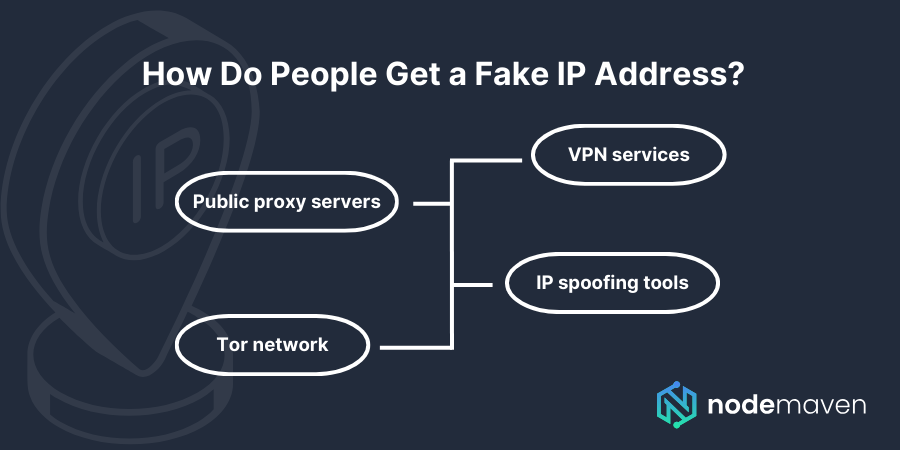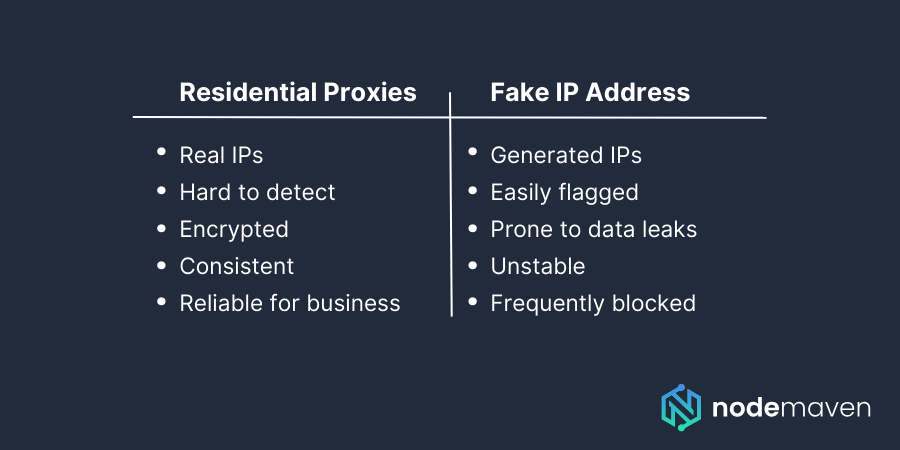In 2024, the average cost of a data breach was $4.88 million. Ridiculous, right?
In an era where online privacy is a top priority, many users turn to solutions that mask their real IP addresses.
Some rely on fake IP addresses generated by VPNs or unreliable proxy services, while others opt for residential proxies, which provide legitimate IPs linked to real devices. But which is the better option?
In this article, we’ll explore the differences between fake IP addresses and residential proxies, why the latter is a superior choice, and how NodeMaven’s residential proxies grant secure and reliable browsing.
What Is a Fake IP Address?
A fake IP address is an artificially assigned or masked IP that differs from a user’s real IP address.
It tricks websites into thinking the connection is coming from a different location, helping users bypass geo-restrictions, maintain anonymity, or evade detection systems.
While this may sound appealing, not all fake IP solutions provide the security and reliability users expect.
How Do People Get a Fake IP Address?
Users can obtain a fake IP address through various methods, including:
- VPN services: VPNs reroute internet traffic through encrypted tunnels, providing users with an IP address from a remote server.
- Public proxy servers: Free or low-cost proxies allow users to browse with a different IP, but these services are often unreliable and easily detectable.
- Tor network: The Tor network enables anonymous browsing by bouncing traffic between multiple volunteer-run nodes. However, its slow speed and association with illicit activities make it a poor choice for many legitimate users.
- IP spoofing tools: More advanced users may manipulate packet headers to appear as if they are coming from a different IP, though this method is illegal in many cases.

Why Fake IPs Are Risky?
While the idea of using a fake IP address may seem beneficial, it comes with significant risks:
- Easily detectable: Many websites and platforms have sophisticated detection systems that flag and block fake IPs, leading to account bans.
- Security concerns: Public proxies and free VPNs often log user activity, making them unreliable for privacy-conscious users.
- Unstable connections: VPNs and free proxies frequently suffer from slow speeds, connection drops, and high latency, making them unsuitable for critical business tasks.
- Limited IP pool: Free VPNs and proxy services recycle the same IP addresses among multiple users, making them highly suspicious to detection systems.
What Are Residential Proxies and How Do They Work?
Residential proxies provide real IP addresses assigned by Internet Service Providers (ISPs) to actual household devices.
Unlike fake IPs, residential proxies offer legitimate and high-quality connections that are less likely to be detected or banned by websites.
Residential Proxies vs. Datacenter Proxies
Residential proxies originate from real devices connected to home internet networks, making them highly authentic and difficult to detect.
On the other hand, datacenter proxies come from cloud hosting services, which makes them faster but also more easily flagged by websites as artificial.
Datacenter proxies are often used for high-speed tasks like large-scale web scraping, where speed is a priority over authenticity. However, websites with strict security measures can easily identify and block them.
Residential proxies, due to their legitimate origins, offer greater anonymity and have a much lower risk of being banned.
Ultimately, if the goal is high trustworthiness and the ability to bypass strict detection systems, residential proxies are the better choice. If speed and cost-efficiency are more critical, datacenter proxies may be preferable.
Rotating Residential Proxies vs. Static Residential Proxies
Rotating residential proxies automatically change the IP address with each request or session, making them ideal for web scraping, automation, and data collection.
Static residential proxies maintain a consistent residential IP for long-term use, which is beneficial for managing social media accounts, e-commerce operations, and other activities that require session persistence.
Key Differences Between Residential Proxies and Fake IP Addresses
Residential proxies and fake IP addresses may serve similar purposes, but their functionality, security, and effectiveness differ drastically.

Why Residential Proxies Are Better Than a Fake IP Address?
While a fake IP address may seem like a quick solution for bypassing restrictions or maintaining online privacy, it often falls short in terms of reliability, security, and long-term usability.
Residential proxies, on the other hand, provide a more robust and legitimate way to mask your IP address without triggering detection systems.
In this section, we’ll explore why residential proxies outperform fake IP addresses in key areas such as anonymity, success rates for business use cases, and overall stability.
Better Anonymity and Security
Residential proxies use real devices and ISP-assigned IPs, making them nearly indistinguishable from regular users.
Unlike fake IPs, which detection systems easily flag, residential proxies provide a secure and private browsing experience without exposing users to potential security risks.
Higher Success Rates for Business Use Cases
For businesses engaged in activities like web scraping, social media automation, and e-commerce, residential proxies are far more effective than fake IPs.
Many platforms have strict anti-bot measures that immediately detect and block fake IP addresses, whereas residential proxies blend in with regular user traffic.
Stability and Reliability for Long-Term Use
Unlike VPNs or public proxies that suffer from connection drops and shared IP pools, residential proxies offer stable and dedicated IP addresses.
This is crucial for users managing multiple accounts, running automated tools, or engaging in high-traffic online activities.
NodeMaven’s Residential Proxies for Secure and Reliable Browsing
If you need secure, reliable, and high-quality proxy solutions, NodeMaven’s residential proxies provide the perfect alternative to fake IP addresses. Here’s why:
- Real ISP-assigned IPs: Get access to genuine residential IPs that are virtually undetectable by websites.
- Rotating and static residential proxy options: Choose between rotating proxies for dynamic tasks or static proxies for consistent account management.
- Advanced anonymity features: Our proxies give complete privacy and protect you from tracking or bans.
- High success rate for businesses: Whether you’re web scraping, automating accounts, or conducting market research, our residential proxies guarantee smooth operations.
- Global coverage with geo-targeting: Access proxies from various countries and regions to bypass geo-restrictions effortlessly.
While fake IP addresses may provide a temporary solution for online anonymity, they come with severe risks and limitations.
Residential proxies, on the other hand, offer a secure, reliable, and effective alternative that secures better success rates for business and personal use.
Sign up for NodeMaven today and experience the difference with premium quality residential proxies!


